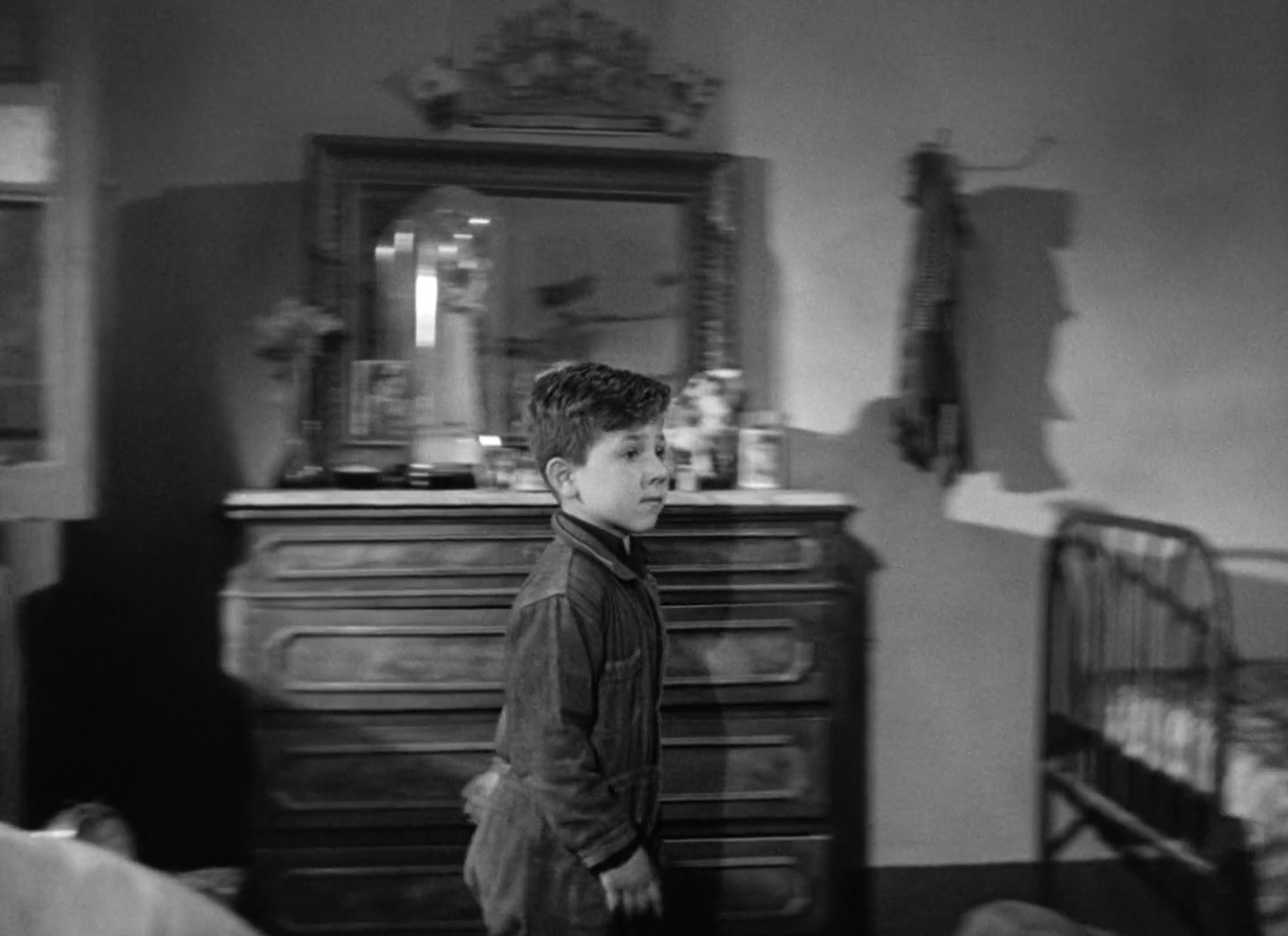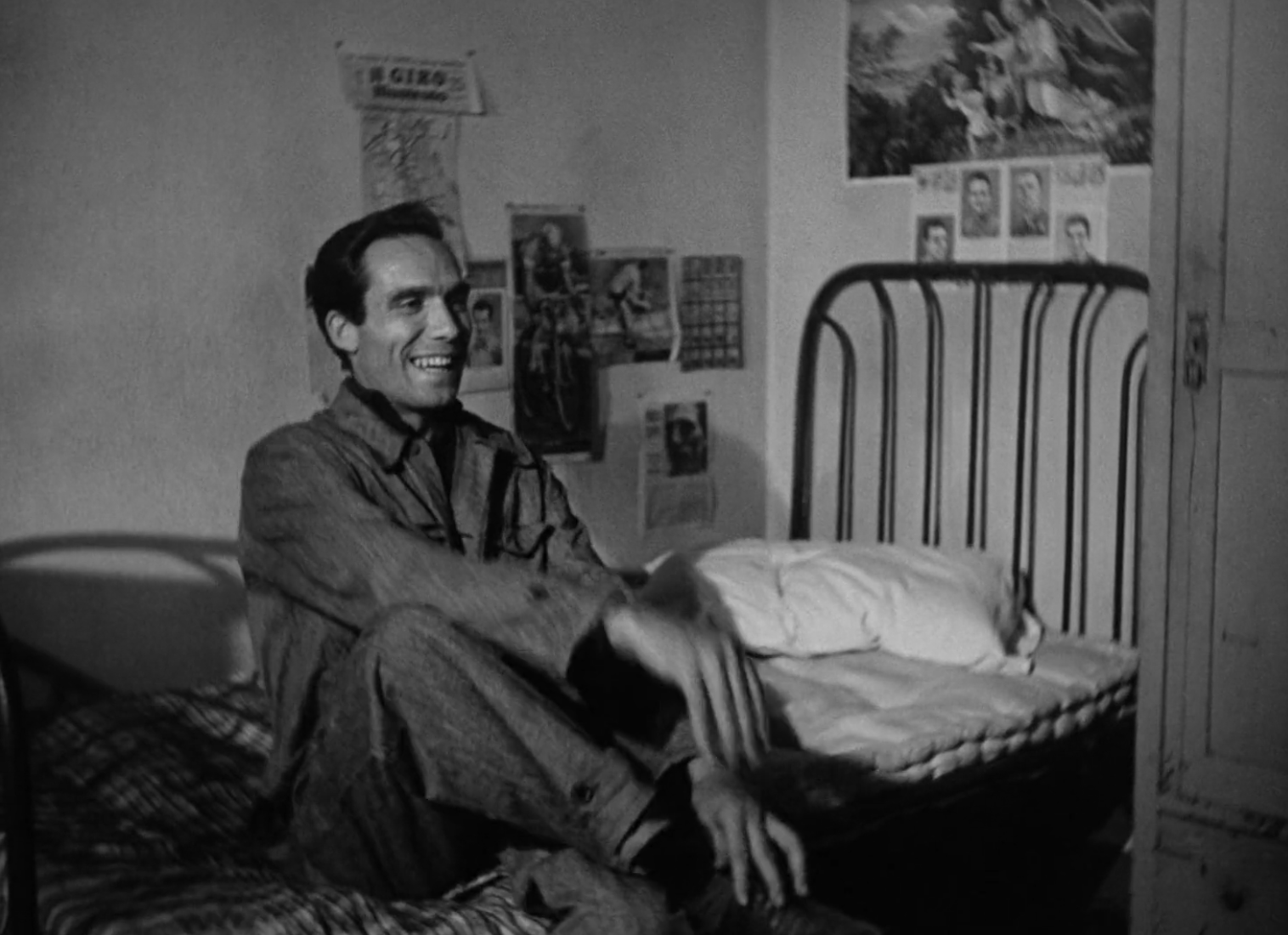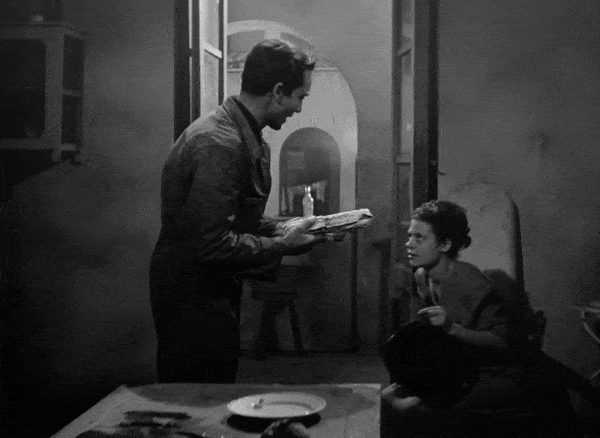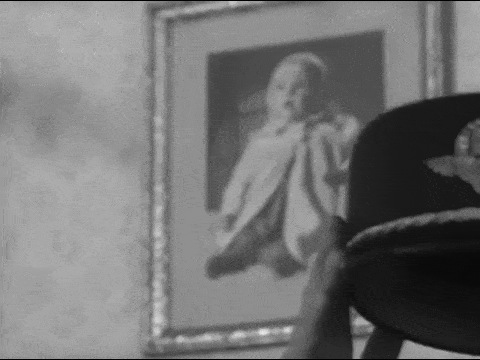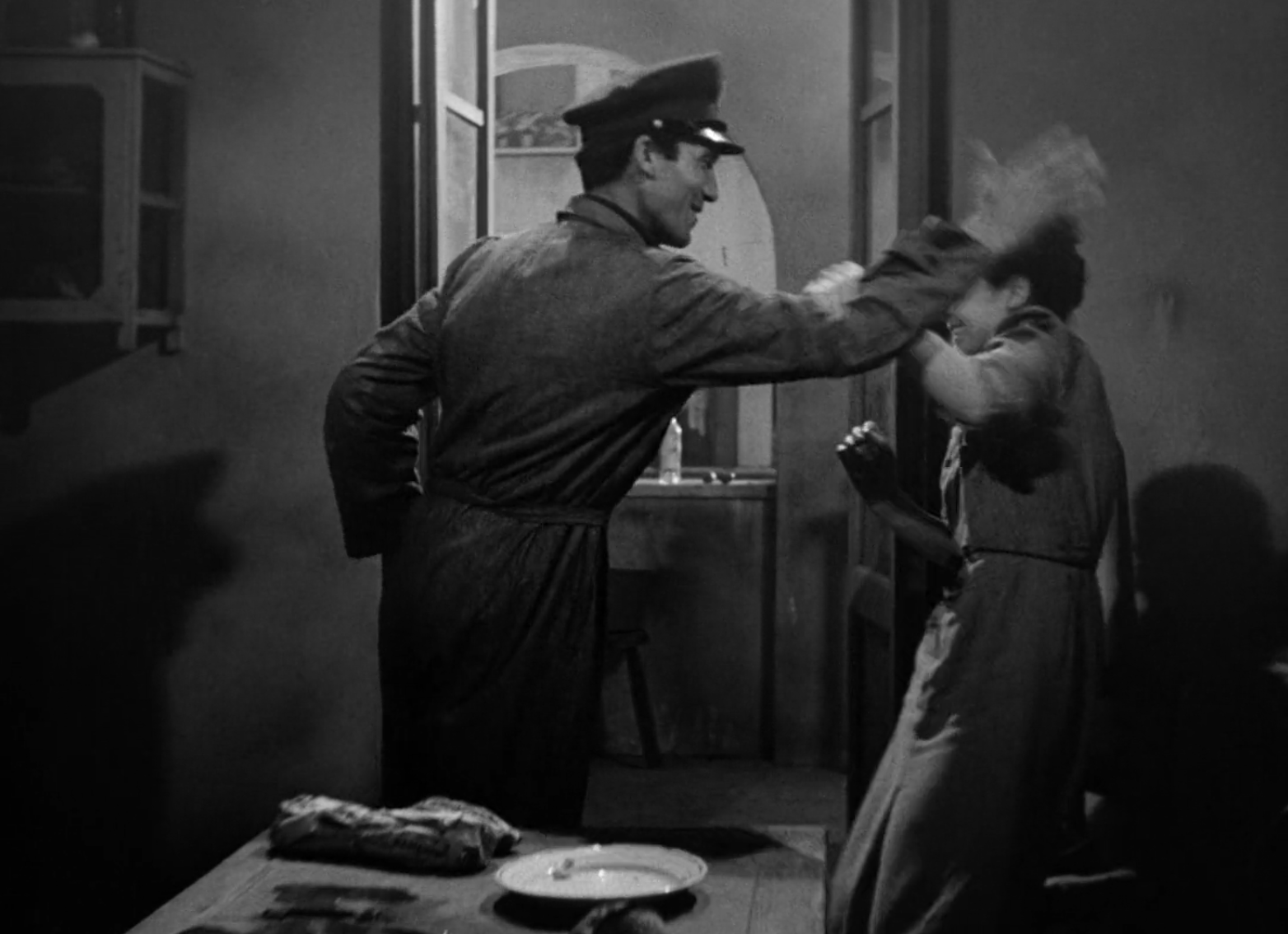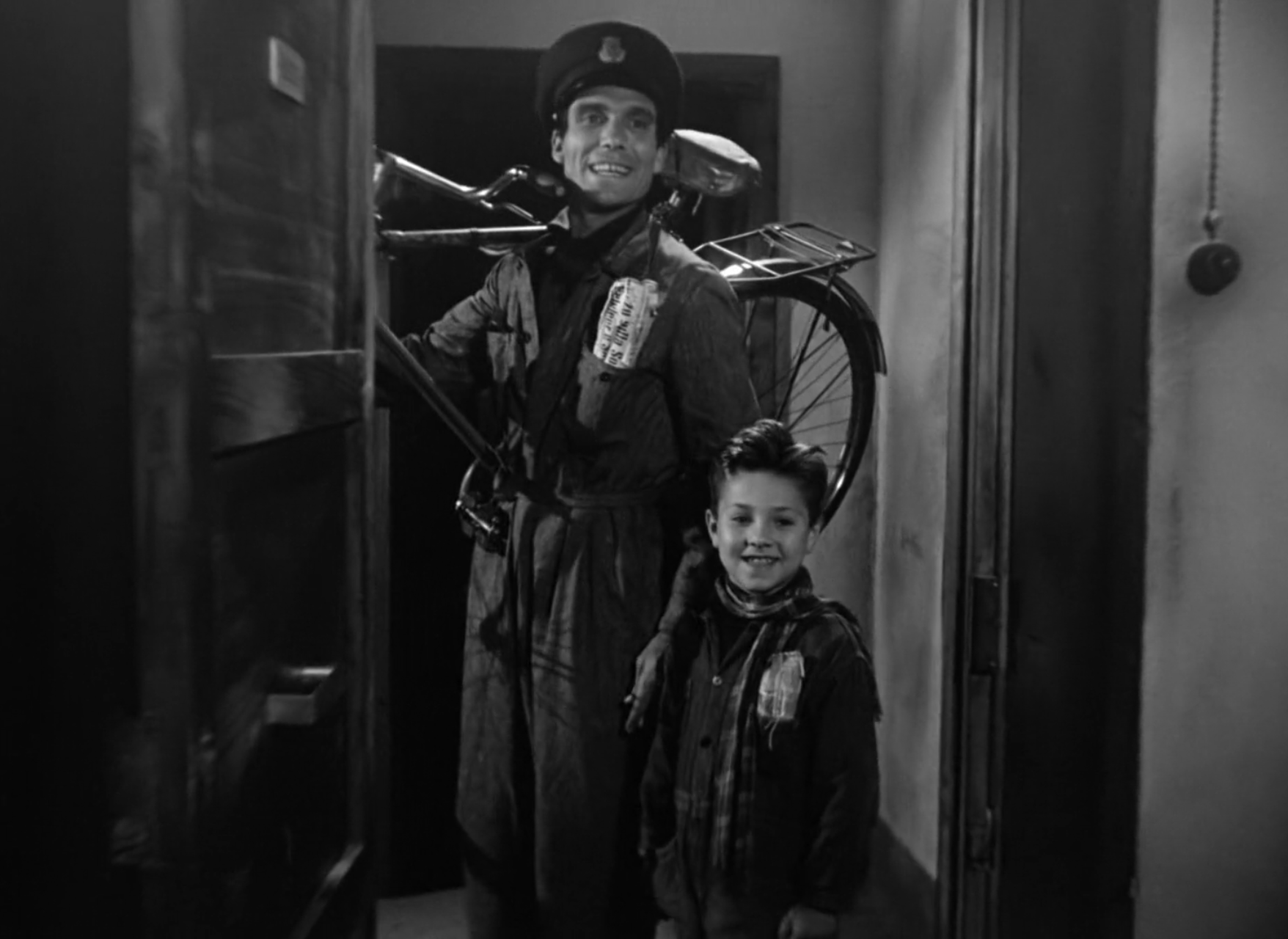Regia / Director: Vittorio De Sica, 1948
Bruno (Enzo Staiola) è nella buia camera da letto e sta pulendo la bicicletta che il padre deve portare al lavoro. Entra Antonio e sussurra: "Sbrigati, Bru’! Sono già le 6:30 di mattina".
Nell'inquadratura, Antonio è incorniciato dalla ruota della bicicletta. Il volto di Bruno, ben illuminato, è al centro, mentre i raggi scuri si irradiano verso l'esterno. In un certo senso, questa composizione riunisce i tre protagonisti del film.
Bruno is in the dark bedroom, cleaning up the bicycle for his dad to take to work. Antonio comes in and whispers, “Hurry, Bru’! It’s already 6:30 in the morning.”
In the shot, Antonio is framed within the bicycle wheel. Bruno’s face, brightly lit, is at the center, while the dark spokes radiating outward. In a sense, this composition brings together the three protagonists of the film.
Bruno risponde: "Non si può pulirla bene. Non ci si vede!"
Posa lo straccio che sta usando e si avvicina alla finestra. Quando apre l’imposta, la luce entra nella stanza e rivela una bambina distesa tra due cuscini sul letto.
Bruno replies, “This can’t be cleaned properly. You can’t see here!”
He puts down the rag he’s using and walks over to the window. When he opens the shutter, light pours into the room, revealing a baby lying between two pillows on the bed.
Dopo aver ripreso il lavoro, Bruno si lamenta: "Papà, hai visto che ci hanno fatto?"
"Che c’hanno fatto?" Seduto sul letto, Antonio sorride al figlio, evidentemente di buon umore.
"Un’ammaccatura".
"Che ci vuoi fare? Forse c'era già".
After resuming his work, Bruno complains, “Daddy, did you see what they did to it!”
“What did they do?” Sitting on the bed, Antonio smiles at his son, clearly in a good mood.
“A dent.”
“What are you going to do? Maybe it was already there.”
"No, non c’era! Chissà come le tengono? Io gli avrei detto: ‘Mica le paghi le riparazioni!’" grida, facendo finta di rimproverare i funzionari del banco dei pegni. Agita la mano da un lato all'altro per enfatizzare. Sembra quasi rimproverare il padre per non essersene occupato.
“No, it wasn’t! ! Who knows how they store them? I’d have told them: ‘It’s not like you pay for repairs!’” he yells, pretending to rebuke pawnshop officials. He wags his hand from side to side for emphasis. He seems almost to scold his father for not taking care of this.
"Ma vuoi stare zitto?" risponde Antonio, anche lui con un gesto, quello tipico della mano a pigna.
"Io glielo avrei detto…." borbotta Bruno e inizia a lucidare con attenzione il pedale.
“Will you be quiet?” Antonio responds with a gesture of his own, the classic one with the hand in the shape of a pinecone.
“I’d have told them…” Bruno mutters and begins intently polishing the pedal.
Vediamo solo per un attimo il corridoio vuoto, gli alti rettangoli che si allontanano verso il fondo dell'inquadratura e la lampadina sospesa che brilla nella penombra. Poi Antonio appare con un sorriso, allacciandosi la cintura.
We see the empty hallway for just a moment, tall rectangles receding to the back of the shot and the suspended light bulb aglow in the half-dark. Then Antonio appears with a smile, fastening his belt.
Poi va in sala da pranzo, dove Maria sta cucendo alla luce della finestra. All'interno della sagoma ad arco, vediamo altri due archi; la biancheria è appesa a un filo.
"È pronto il berretto, Mari’?" chiede Antonio.
"Sì", risponde lei spezzando il filo con i denti.
Prendendo un pacchetto avvolto in un giornale, lui chiede: "Che hai fatto?"
"Frittata".
Then he goes to the dining room, where Maria is sewing by the light from the window. Within its arched outline, we see two more arches; washing hangs on a line.
“Is that cap ready, Mari’?” Antonio asks.
“Yes,” she answers, cutting the thread with her teeth.
Picking up a packet wrapped in newspaper, he asks, “What did you make?”
“Frittata.”
Maria si alza e gli mette il berretto in testa, valutandolo.
In una scena simile, il berretto dell'uniforme viene posato delicatamente e cerimoniosamente su Miloš, un controllore ferroviario ceco appena assunto, in Treni strettamente sorvegliati (Jiří Menzel, 1966). Un lento sorriso trasforma il suo volto. Ne L'ultima risata (F. W. Murnau, 1924), un film muto tedesco, il portiere si intrufola addirittura nell'hotel dove lavora per rubare la sua uniforme dopo essere stato declassato. L'orgoglio per l'uniforme sembra essere universale.
Maria stands and places the cap on his head, appraising him.
In a similar scene, the uniform cap is set delicately and ceremonially on Miloš, a newly hired Czech train dispatcher, in Closely Watched Trains (Jiří Menzel, 1966). A slow smile transforms his face. In The Last Laugh (F. W. Murnau, 1924), a German silent film, the doorman even sneaks into the hotel where he works to steal back his uniform after he is demoted. Pride in a uniform seems to be universal.
"Fammi vedere" – dice Maria – "Ammazza!"
"Sono bello?"
Scherzando, lei risponde: "Ah, mi pari un poliziotto!"
Lui la afferra, giocosamente, e si azzuffano. "No, che mi fai male!" – gli dice lei ridendo – "Stai fermo! Sveglierai la ragazzina!" Lo spinge via.
“Let me see,” Maria says. “Damn!”
“Do I look handsome?”
Joking, she replies, “Ah, you look like a cop to me!”
He grabs her, playfully, and they tussle. “No, you’re hurting me!” she tells him, laughing. “Stop it! You’ll wake the baby!” She pushes him away.
Lei si risistema i capelli e gli sorride. Poi lui si china e le bacia la guancia. Esce dalla stanza, con il berretto calzato a pennello sulla testa.
She puts her hair back in place, grinning at him. Then he leans over and kisses her cheek. He leaves the room, cap fitting perfectly on his head.
Nella camera da letto, Bruno posa uno sgabello di legno davanti allo specchio e ci sale sopra. Entrando, Antonio dice: "Tieni, Bru’. Frittata!"
In the bedroom, Bruno sets down a wooden stool in front of the mirror and climbs on it. Entering, Antonio says, “Here, Bru’. Frittata!”
Padre e figlio sono in tuta da lavoro. In piedi sul suo sgabello, Bruno sorride felice mentre infila il suo pranzo nella tasca superiore, rispecchiando il gesto del padre, come se fossero solo due tipi che si preparano per il lavoro.
Father and son are in work overalls. Standing on his stool, Bruno smiles happily as he tucks his lunch into his top pocket, mirroring his father’s gesture, as if they are just two guys getting ready for work.
Guardandosi allo specchio, Bruno si pettina i capelli con cura. I violini iniziano a suonare un tema lento e malinconico.
Looking in the mirror, Bruno carefully combs his hair. Violins begin to play a slow and melancholy theme.
Bruno prende la sciarpa dalla struttura del letto e se la avvolge intorno al collo. Il padre riappare con la bicicletta in spalla.
Bruno takes down the scarf from the bed frame and wraps it around his neck. His father reappears with the bike over his shoulder.
L'atmosfera della musica si alleggerisce temporaneamente quando si aggiusta il cappello allo specchio, mentre Bruno, dietro di lui, si aggiusta con cura la sciarpa.
The mood of the music temporarily lightens when he adjusts his hat in the mirror, as Bruno, behind him, carefully adjusts his scarf.
"Andiamo", dice Antonio a bassa voce, guardando teneramente suo figlio.
“Let’s go,” Antonio says quietly, looking tenderly at his son.
Mentre Antonio se ne va, Bruno si volta a guardare la sorellina, distesa sul letto tra due cuscini.
As Antonio leaves, Bruno turns to look at his baby sister, lying on the bed between two pillows.
Si avvicina alla finestra e, allungandosi verso l’alto, chiude le imposte così che la bambina possa dormire.
He walks to the window and, reaching up, closes the shutters so that the baby can sleep.
Sulla soglia, Bruno urla: "Ciao, mamma!" Antonio gli fa eco: "Ciao, Mari'!"
"Ciao!" risponde lei da fuori campo. Padre e figlio, incorniciati nella porta, sono un doppio ritratto di felicità e speranza.
In the doorway, Bruno calls out, “Bye, Mama!” Antonio echoes him, “Bye, Mari’!’”
“Bye!” she answers softly from offscreen. Father and son, framed in the doorway, are a double portrait of happiness and hope.
FINE PARTE 6
Ecco Parte 7 of this cineracconto! Subscribe to receive a weekly email newsletter with links to all our new posts.




